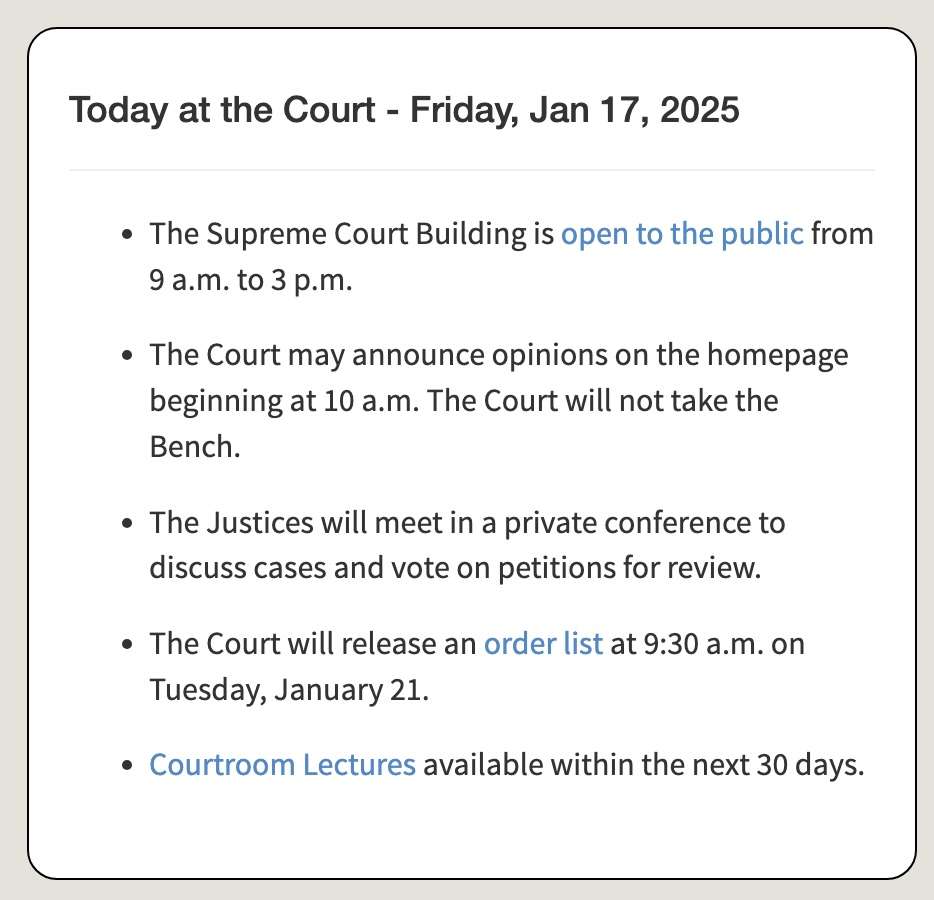The Volokh Conspiracy
Mostly law professors | Sometimes contrarian | Often libertarian | Always independent
SCOTUS May Announce Opinions, But Will Not Take the Bench.
Will TikTok ruling come at 10 ET?
I just noticed an unusual notation the Supreme Court's website for Friday, January 17: "The Court may announce opinions on the homepage beginning at 10 a.m. The Court will not take the Bench."

The last time I saw this notation was on March 3, 2024. The following day, the Court announced Trump v. Anderson. It seems this is the notation for big cases, decided on an irregular schedule, which the Justices want not part in announcing in person.
It looks like we may get some ruling in the TikTok case. What will it be? Perhaps an administrative injunction? A summary affirmance? An actual ruling on the merits, written in a week? We will see soon enough.
Editor's Note: We invite comments and request that they be civil and on-topic. We do not moderate or assume any responsibility for comments, which are owned by the readers who post them. Comments do not represent the views of Reason.com or Reason Foundation. We reserve the right to delete any comment for any reason at any time. Comments may only be edited within 5 minutes of posting. Report abuses.
Please to post comments


"Justices want not part"
And I thought that *I* used archaic English...
Perhaps we will see a policy announcement, made by the nation's newly-most-powerful legislative branch, without even a case or controversy argued before the Court.
Per Curiam, TikTok loses: https://www.supremecourt.gov/opinions/24pdf/24-656_ca7d.pdf
There's one bit of bizarre pure sophistry in the decision: it's clearly a content-based law, because it does not apply to sites that primarily host product reviews or the like. And SCOTUS essentially concedes that. So how does SCOTUS get around that inconvenient fact? It says that the law isn't content-based with respect to TikTok, because the law bans Tiktok regardless of its content.
Got that? If there's a city park that is generally open for speech, but the city passes an ordinance saying, "Talking about religion in this park is banned; anyone who does so shall be expelled," that would not be content-neutral, and anyone who wanted to talk about religion could get that enjoined on that basis.
But SCOTUS holds today, if the ordinance instead says, "Bob Smith, and anyone who talks about religion, shall be banned," then even though 330,000,000 other Americans can challenge that as content-based, Bob Smith can't because the law applies to him regardless of what he says.
Bob Smith would have a pretty good equal protection challenge. Plus, it would matter if the city had evidence that Bob Smith was planning to do something illegal or dangerous in the park.
More like the city saying the park is open for speech, but Bob Smith is banned, because he's a pedo and we think he's a danger to kids. Even if lots of kids like the candy he passes out.